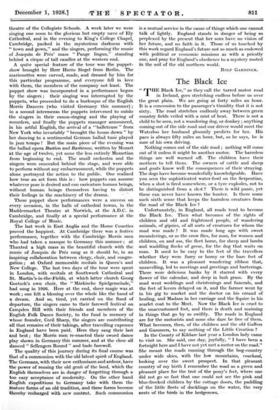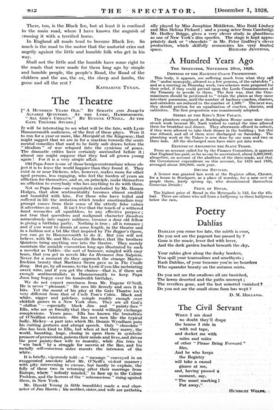The Black Ice
" THE Black Ice," as they call the tarred motor road in Ireland, goes stretching endless before us over the great plain. We are going at forty miles an hour. It is a concession to the passenger's timidity that it is not sixty. The road stretches endlessly away between green country fields veiled with a mist of heat. There is not a child to be seen, not a wandering dog, or donkey ; anything coming out of the side road and our driver would meet the Waterloo her husband gloomily predicts for her. His pace is always fifty miles an hour, but, as he says, he is sure of his own driving.
Nothing comes out of the side road ; nothing will come out of it unless it might be another motor. The harmless things are well warned off. The children have their mothers to tell them. The owners of cattle and sheep and goats know well the consequences of their straying. The dogs have become wonderfully knowledgeable. Have you seen the sophisticated water-fowl on the Serpentine, when a shot is fired somewhere, or a tyre explodes, not to be distinguished from a shot ? There is wild panic, yet these can never have known the hunter. Is there some such sixth sense that keeps the harmless creatures from the road of the Black Ice ?
Unfortunately, in England, all roads tend to become the Black Ice. Then what becomes of the rights of children and old and frightened people, of wandering animals, of gipsies, of all sorts of creatures for whom the mad was made ? It was made long ago with sweet meanderings, or as the crow flies, for man, for women and children, ox and ass, the fleet horse, for sheep and lambs and waddling flocks of geese, for the dog that waits on man. It used to be easy to the feet of the travellers whether they were furry or horny or the bare feet of children. It was a pleasant wandering ribbon' that, unravelling, led to meetings and greetings and barterings. There were delicious banks by it starred with every flower of the calendar, and deep in lush grass. By the road went weddings and christenings and funerals, and the feet of lovers delayed on it, and the farmer went by in his gig to market and the doctor on his errand of healing, and Madam in her carriage and the Squire in his scarlet coat to the Meet. Now the Black Ice is cruel to the unaccustomed feet, and there is death and maiming in things that go by so swiftly. The roads in England are for the motorists and none 'else dare be free of them. What becomes, then, of the children and the old Gaffers and Gammers, to say nothing of the Little Creation ?
In the County of Kildare last year a London lady came to visit us. She said, one day, joyfully, " I have been a fortnight here and I have not yet met a motor on the road." She meant the roads running through the bog-country under wide skies, with the low mountains, couthant, looking over the sweet prospect. In that pleasant country of my birth I remember the road as a green and pleasant place for the trot of the pony's feet, where one did not go so fast that one could not see the pink and blue-frocked children by the cottage doors, the paddling of the little fleets of ducklings on the water, the very nests of the bittls in' the hedgerows. There, too, is the Black Ice, but at least it is confined to the main road, where I have known the anguish of crossing it with a terrified horse.
In England all roads tend to become Black Ice. So much is the road to the motor that the motorist cries out angrily against the little and humble folk who get in his way.
Shall not the little and the humble have some right to the roads that were made for them long ago by simple and humble people, the people's Road, the Road of the children and the ass, the ox, the sheep and lambs, the geese and all the rest ?
KATHARINE TYNAN.









































 Previous page
Previous page